How to Be a Successful First-Generation Student: Top 11 Tips
Here’s an interesting fact: did you know that according to statistics, 30% to 50% of all US students are first-generation? And what’s more, this number continues to soar year by year.
Universities love first-gen students: dynamic, driven, and eager to conquer challenges and sharpen their skills. Sadly, there are many obstacles holding them back. A lack of cultural capital and proper financing prevents them from reaching their desired goals.
Are you a first-gen student yourself? If so, then definitely check out this article! Here, our team will tell you how to enhance your academic experience and overcome first-gen challenges on your path to success. Let’s dive in!
💡 Interesting Facts about First-Gen Students
So, what are first-gen students like? What distinguishes them from other student identities? Well, to answer these questions, let’s examine some key facts and statistics regarding first gens:
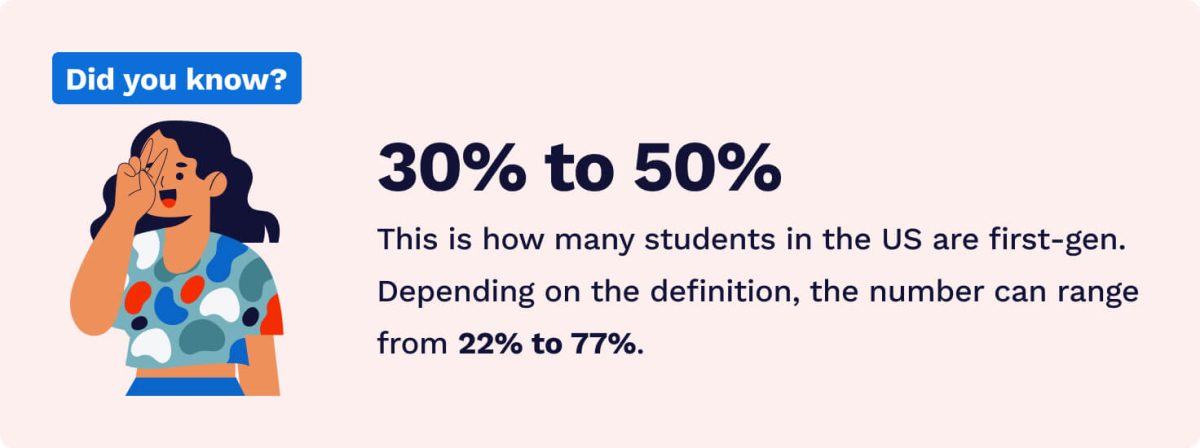
- First gens are more likely to come from poor socioeconomic backgrounds or racial minorities.
- 10% of them are also first-gen Americans. Another 23% of them have foreign-born parents.
- Only 28% of such students are older than 30.
- 56% of first-gen students have parents without any academic degrees.
- Only 27% of them finish college within 4 years.
- Regarding fields of study, first-generation students favor business and social and behavioral sciences.
- Being a first gen is not the same as being a low-income student. These are two distinct statuses.
- Earning a college degree means more for them than just getting a degree. It’s a way to break the cycle of poverty and open doors to bigger opportunities.
There are many reasons for which students can be considered first-generation. That’s why it can be challenging for people to determine if they have this status. Are you unsure about yours? Keep reading—we will sort it all out.
🎓 Who Can Be Considered a First-Generation Student
Every college has its own set of parameters used to determine first-gen students. The majority uses the federal government’s definition, which states that a student can be considered first-gen if they are:
1. An individual both of whose parents did not complete a baccalaureate degree.
2. Someone who received support from only one parent.
3. A person whose only parent did not complete a baccalaureate degree.
Some colleges have their own ways of determining first-gen status according to their preferred parameters. In total, there are more than 8 definitions of first-generation students!
Here’s an interesting fact: according to the research done by Robert K. Toutkoushian, the percentage of first-generation students in a sample of 7,300 people ranged from 22% to 77%, depending on the definition. This, of course, makes it difficult to avoid confusion.
What Makes First Gens Hard to Define
When colleges decide whether or not they should count someone as first gen, they review this person’s background. Sometimes, they may find complicated aspects that can be interpreted in different ways.
For example, can your college-going siblings hinder you from receiving a first-gen status even if your parents don’t have degrees? Or what about students whose parents completed their bachelor’s outside the US? There are no direct answers to these questions, so each university must decide for itself.
Despite these differences, most colleges stick to one primary parameter—cultural capital. It’s a quality that determines how hard it will be for a student to enroll and study in a university, considering the lack of established family traditions related to attending college.
A lack of cultural capital can undermine first-generation students’ self-esteem, causing them to feel like they don’t belong with other students. In the worst cases, it can discourage them from attending school altogether. This is what makes it a particularly important criterion that sets first gens apart from other student identities.
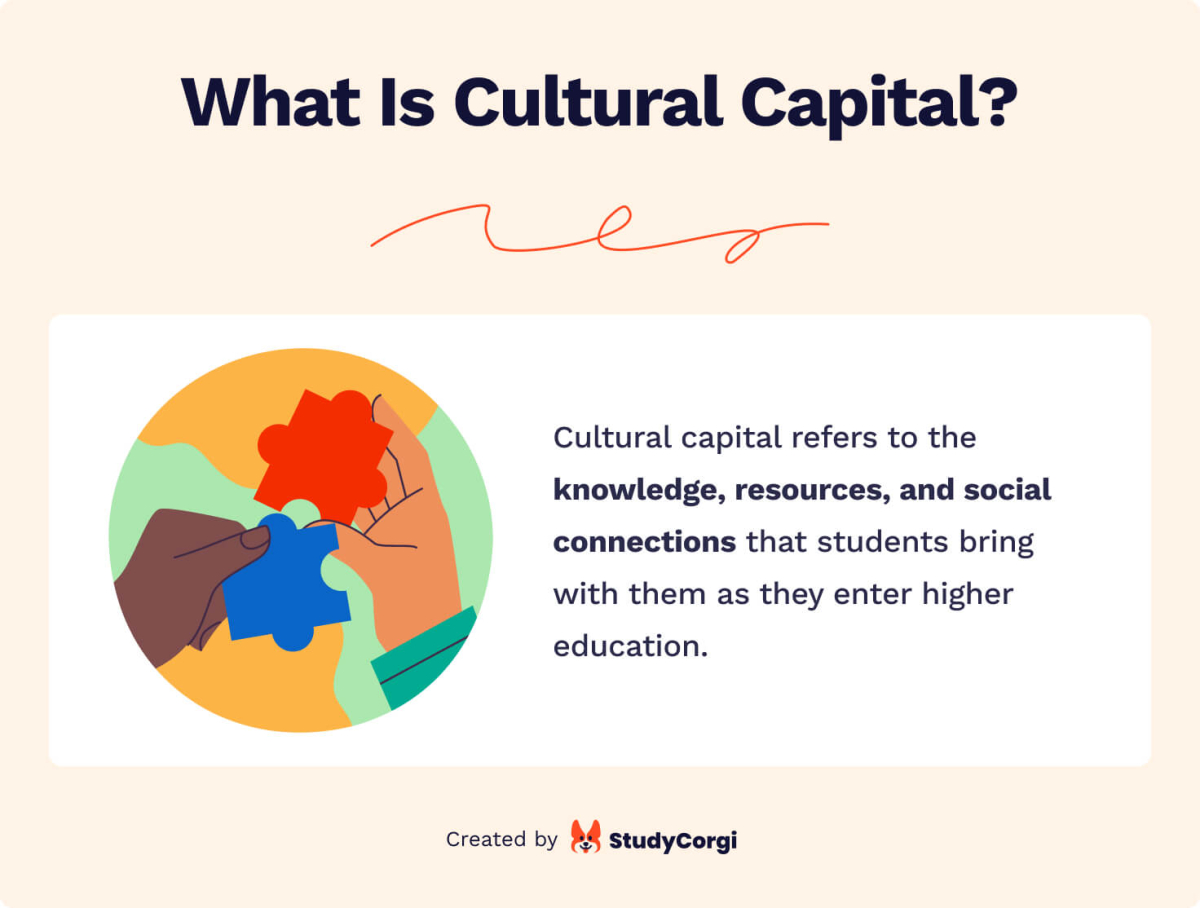
While defining first gens is not easy, it’s still crucial for the US education system. Without it, it would be impossible to complete many essential tasks:
- Recognize first-generation students,
- Monitor their academic and extracurricular development,
- Highlight first gens’ successes,
- Quantify essential learning outcomes,
- Compare them to students at other institutions, national data sets, etc.
😱 What Challenges Do First-Generation Students Face?
Being a first gen grants you many possibilities, and overall, it’s a great thing to be. Still, there are some serious challenges associated with this status. Let’s see what these issues are and how serious they can become.
Financial Concerns
📌 The lack of financial resources. First-generation students tend to come from lower-income families. As a result, they often require larger loans and grants.
📌 The need to earn money. First gens might need to work part-time while in college to pay for their financial responsibilities. This adds to their stress and takes time away from their studies. According to statistics, financial difficulties are the leading cause of first-generation students’ dropouts.
Academic Difficulties
📌 The lack of academic experience. First-generation students often come from less demanding secondary schools or have lower GPA scores. Because of this, they may lack confidence and have difficulty understanding the educational system. They may also struggle to navigate the bureaucracy inherent in the academic framework.
📌 Nobody to ask for advice. First gens, unlike others, cannot rely on their parents’ academic experiences to overcome possible obstacles. These students might be unfamiliar with how to use the college’s resources that are available to them, such as counseling, work-study opportunities, healthcare options, and internships.
Psychological Challenges
📌 Imposter syndrome. Imposter syndrome makes you doubt your accomplishments and skills. It’s especially prevalent among less-privileged students. Although this feeling is understandable, it’s hazardous for students. If they continue feeling like they belong with their peers, they may start lagging behind or even drop out.
📌 Constant stress. Low academic self-esteem, underrepresentation, and trouble transitioning to college can burden students enrolling for the first time. These issues lower their college completion rate compared to students who have at least one parent with a degree.
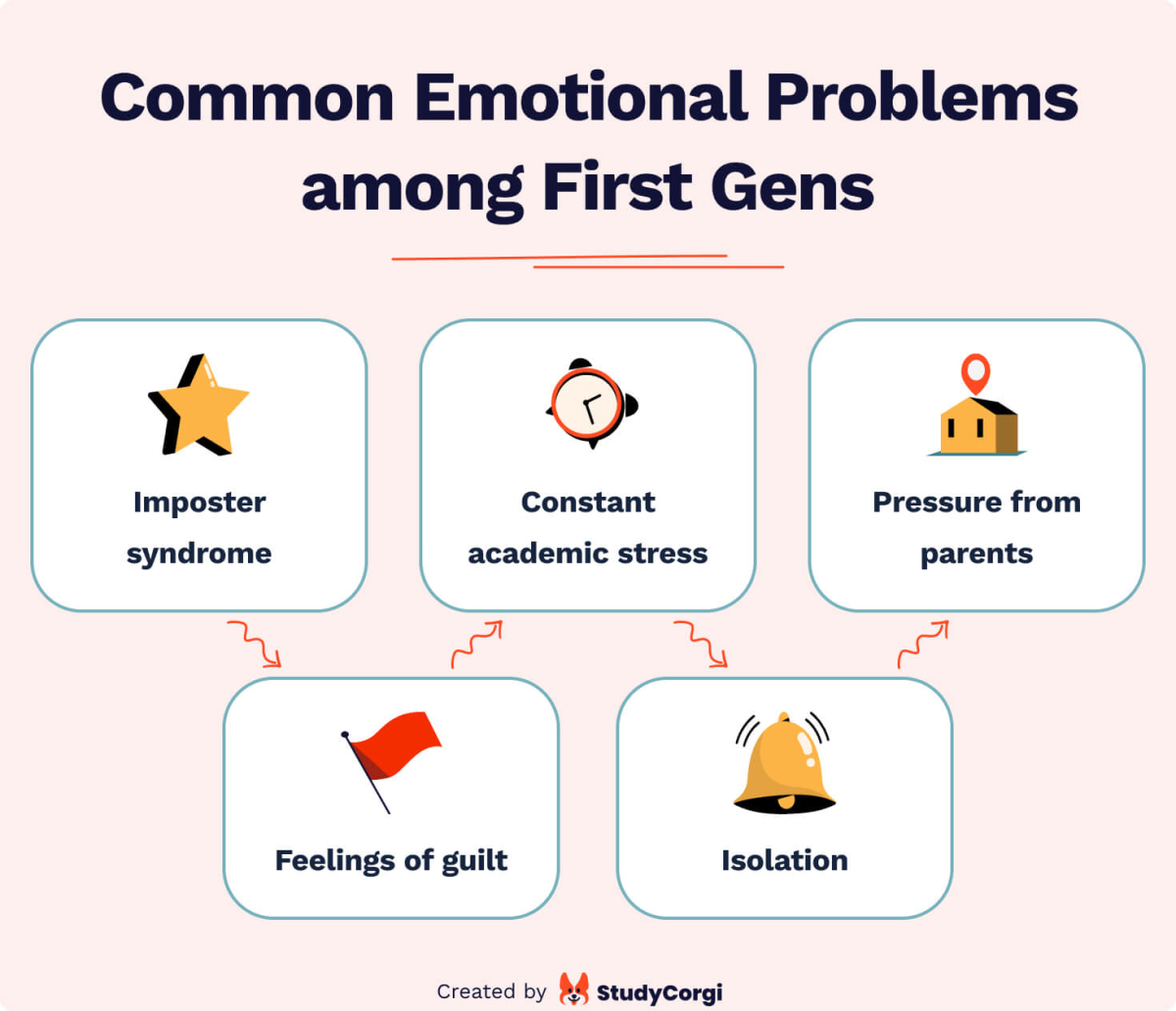
Problems with Parents
📌 The feeling of guilt. Many first-generation students feel guilt about leaving their families and abandoning their financial obligations back home. They may also experience grief at having opportunities that other family members did not receive, as well as regret over seemingly rejecting their past.
📌 The pressure that comes from parents. For first-generation and low-income students, maintaining family relationships can be more challenging than for others. Their parents frequently display hostility or, at the very least, frustration due to the fear of losing their child to education. First-generation students are more likely to stay at home and commute to college, attend a school closer to home, or even drop out entirely because of problems with their parents.
Difficulty Fitting In
📌 Avoiding social interactions. First-generation students may become isolated due to their insecurities and fears about being accepted. Feeling this way forces them to avoid attending campus-based social gatherings and other activities like spring break.
📌 Being a part of a minority. More than 1/3 of first-generation students come from racial or ethnic minority groups. Due to their socioeconomic status, they might become the focus of prejudice. As a result, their mental health and academic performance may suffer, which can also cause alienation and even marginalization.
Social Disadvantage
📌 Having fewer opportunities. Middle- and upper-class teens frequently follow in their parents’ footsteps by enrolling in college from a young age. They tend to focus more on where they should study rather than whether they should study at all. In contrast, first-generation students are notably underrepresented in four-year colleges. Ultimately, they become disadvantaged in the job market and lose valuable opportunities for upward mobility.
📌 Feeling underprivileged. While these class-based inequalities mainly form during the transition from high school to college, it’s vital to note that they may persist throughout the entire academic year. First-generation students also tend to participate in less culture-related activities than their peers. This is important because getting involved in student organizations, studying abroad, and conducting research with faculty members could help them integrate into the college community and develop abilities relevant to the job market.
🌱 Why Is Support for First-Gen Students Important?
If you’re a first-generation student, you’re probably worried about all these potential problems. Knowing that 1/3 of all first-gen students drop out, the picture may seem gloomy. But don’t get discouraged! Things are actually much better than that.
Luckily, colleges know about these problems and will do everything they can to help you. Many of them introduce new policies, work on inclusive environments, and offer all kinds of support to empower first gens.
We recommend you to create a list of colleges where this support is the most active. Before choosing your dream school, take a look at which programs and special grants they offer to first-gen students. To start with, look for the following options:
- Early introduction to campus. This allows you to get accustomed to academic life before you begin studying.
- Focused academic support. This activity includes various extracurricular classes, supplementary courses, etc., which allow you to improve your skills and avoid dropping out.
- Connecting to faculty members. There are many ways to get in touch with your professors or mentors who can support you and help you throughout your academic experience.
- Grants and scholarships. These programs will connect you with the funds necessary to continue your studies.
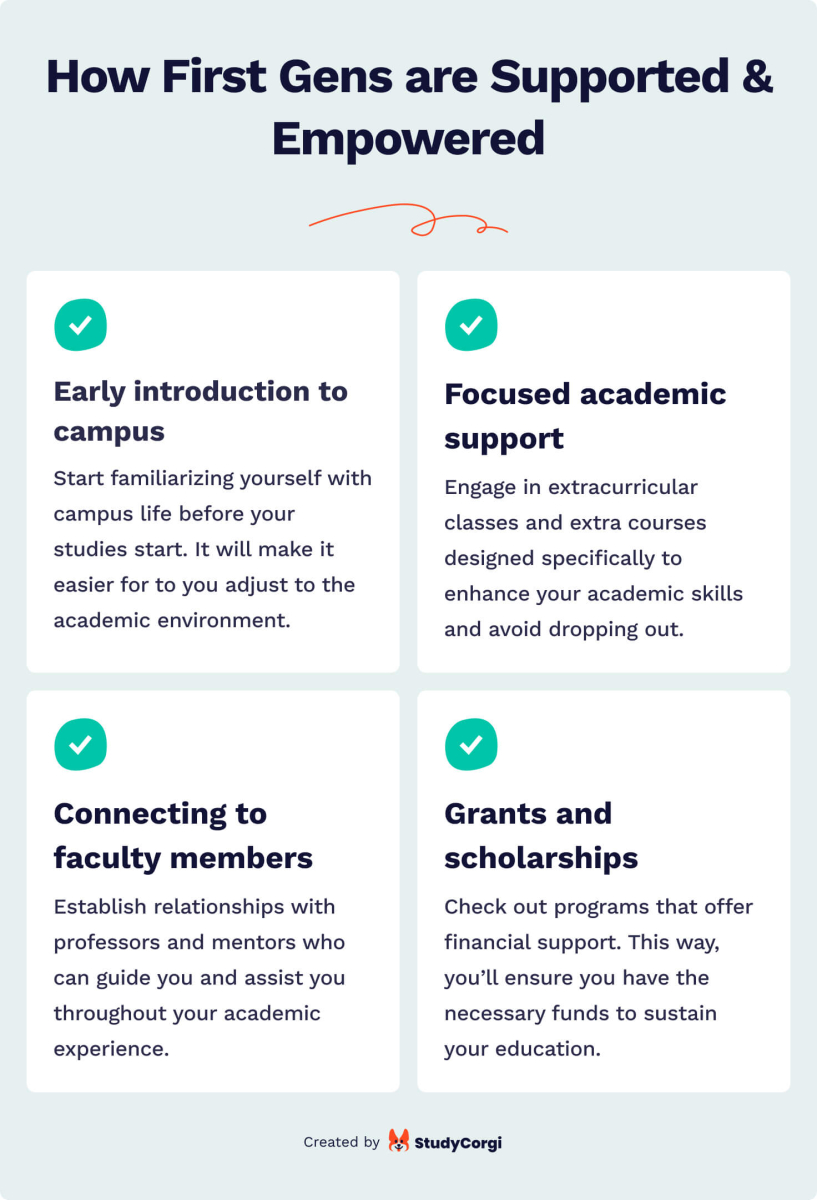
In addition to this, there are many more things that can ease your academic life and help you to become a better student. Continue reading to learn more!
🎉 How to Deal with the Difficulties: Top 11 Tips
Now that we’ve highlighted the most common first-generation student issues, it’s time to discuss how to solve them. The section below will offer valuable tips that will help you overcome many obstacles on your academic path. Check it out!
1. Fight Imposter Syndrome
If you’re feeling insecure and out of place, use this simple reminder:
Other students got their place at the school thanks to what they already had. In other words, their parents gave them the possibility to become privileged. You, however, had nothing and yet managed to get a spot in college. As a first-gen student, you had to work twice as hard, and that’s why you have definitely earned your place.
Remember this the next time you feel like an imposter.
2. Be Kind to Yourself
To be productive, you must stay healthy. This means being conscious of how you’re treating your body and mind.
Nothing is ever worth sacrificing your physical or emotional well-being. Even if being first gen means working twice as hard, be sure to give yourself the time and space to recover. Forgiving your weaknesses and limitations is one of the most important things to learn. Without it, you’ll burn out of motivation very quickly.
3. Ask for Help
Another good thing about the first gen status is that you have the full right to use all the college’s resources. If the admission committee has accepted you, it means that you’re an official student, and there are tons of benefits at your disposal—you just need to be aware of them.
The more things you use to your benefit, the richer your academic life becomes. So, don’t hesitate to ask mentors for help, attend counseling gatherings, use work-study opportunities, ask for healthcare proposals, participate in any internship your college offers, etc.
4. Stay True to Yourself
Many students consider college a place where you can reinvent yourself and hide your true nature and background. In reality, it’s all about doing the things that make you happy, not about trying to become someone you aren’t.
As a first gen, you’ve got to stay true to yourself and be proud of who you are. Give yourself the time and resources to really understand what you want to be. Acting on your values will give you strength, whereas pretending to be somebody else will weaken you and drain your mental energy.
5. Learn to Manage Stress
One of the most important things you should do in college is build a strong support network. In particular, connecting with other first-generation students can be an enormous source of mental strength and confidence. Trust us, it will get much easier once you start communicating with people familiar with your experience!
You can also manage your stress in college with the help of books, peer support groups, mental health specialists, and even online apps. We especially recommend trying mindfulness meditation and breathing exercises.
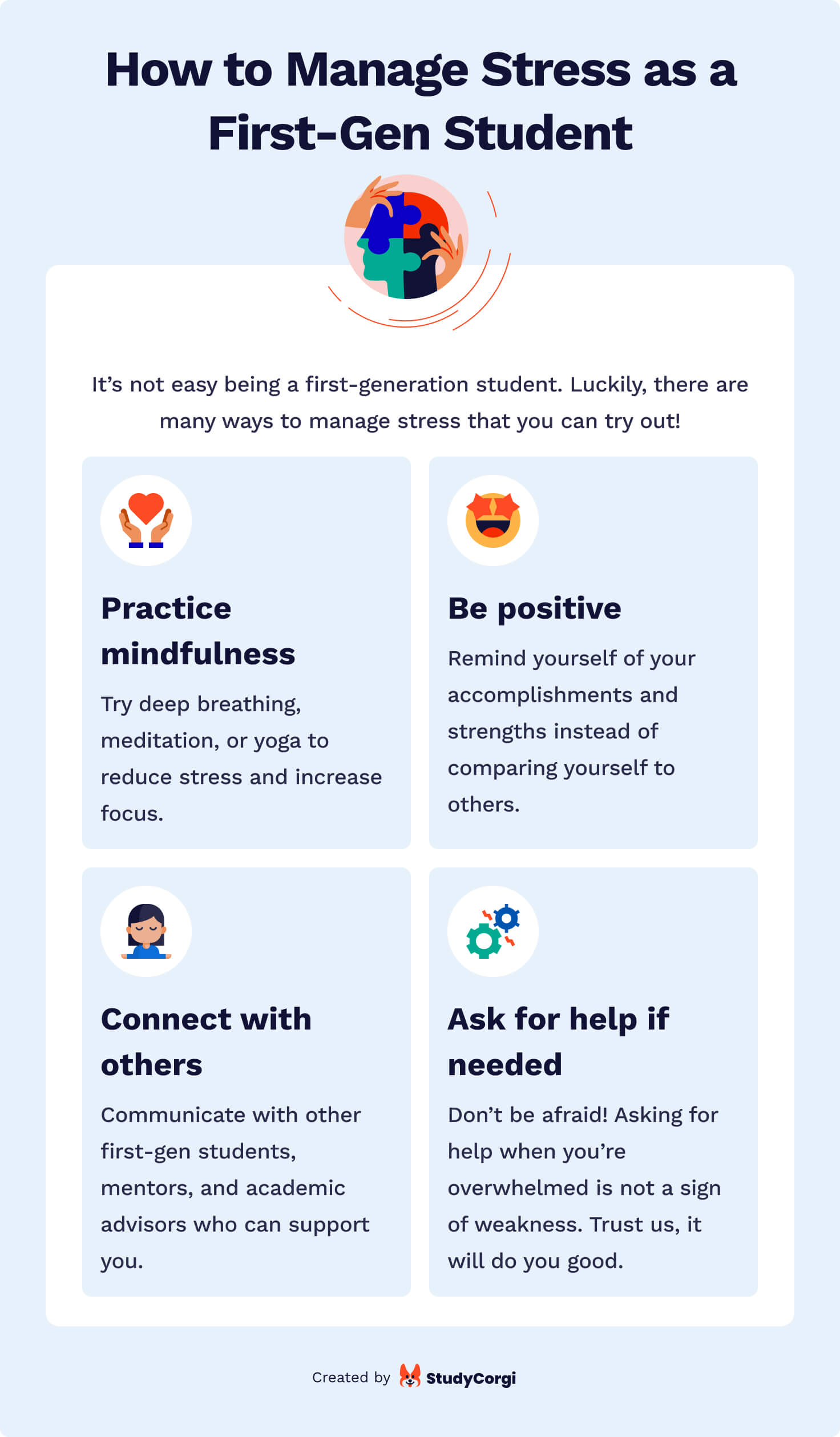
In order to fight stress, it’s vital to know what causes it. Here are some of the most popular sources of stress for first-gen students:
❌ The pressure that comes from family.
❌ The need to constantly improve your academic knowledge.
❌ The necessity to prove that you are worthy of a place at your university.
❌ The pressure that comes from more privileged students.
If you experience excessive stress, don’t hesitate to ask a campus psychologist for help.
6. Network & Connect with College Staff
There are many ways to gather valuable information and make connections while you’re in college. Academic advisers are especially invaluable in this regard. Essentially, their job is to help students with course registration and class selection. They can also point you toward the college’s infrastructure or put you in touch with other campus services. Admissions offices also often provide academic guidance.
In addition, first-generation students can find support from college mentors. For example, you might ask them how to set and achieve your academic or professional goals. To learn about all of the resources available to you, it’s best to speak with an advisor and mentor before classes start.
7. Choose a Major Early
Picking a major as soon as possible will help you get ready for college, deepen your knowledge, or even take honors courses and other programs in advance. It will also prevent you from spending time on preparations you don’t actually need.
To choose a major, consider your options and gather as much information about them as possible. Ask mentors and advisors, check which majors are the most popular among other students, and finally, listen to your feelings. The sooner you choose, the sooner you’ll start working toward the goal.
8. Study What You’re Interested in
Your major should relate to your personal preferences. It’s not about simply picking a subject that is popular among other students. Instead, try to find something that you would really like to learn. This will give you a giant boost of confidence, and you’ll eventually achieve much more than if you’d picked a popular major that you aren’t interested in.
9. Try to Gain Real-Life Experience
While studying, try to be as active as possible and take advantage of every career opportunity. We especially recommend paying attention to nonprofit or part-time jobs. They are a great way to earn valuable experience and try out your theoretical knowledge in practice. This way, you’ll become more experienced and may even accumulate some extra credit before you graduate!
If you participate in a part-time project, you can use it as part of your CV when you apply for a job. Employers prefer to hire active candidates with relevant experience rather than those with excellent grades. So, in many ways, the skills you obtain in practice are more valuable than your diploma.
10. Work on Your Soft Skills
Soft skills are non-technical competencies that will be useful in workplace. They consist of your interactions with coworkers, problem-solving abilities, and time management.
Developing a set of soft skills is an absolute must for any successful student. According to statistics, 89% of employees lack relevant soft skills, which prevents them from achieving career prospects. First-gen students also tend to lack soft skills and experience difficulties developing them.
Want to start working on your skills right now? Try following these tips:
- If you want to build resilience and become more emotionally mature, it’s vital to embrace empathy, forgiveness, and self-awareness. These qualities are essential in both academic and interpersonal situations.
- Critical thinking is also key to effective communication. It will help you understand different perspectives on subjects and differentiate truth from fabrication. To improve your critical thinking skills, learn to be skeptical about what you read and always keep an open mind.
- Another critical aspect is teamwork and collaboration. When you enroll in college, you meet people from near and far. Whether they are locals or international students, it’s essential to be able to work together. These interactions will enhance your compassion, sensitivity, and flexibility.
11. Avoid Comparing Yourself to Others
Every student has their advantages and disadvantages. Some have money, some have charisma, while others have neither but still manage to become successful. You also have many strong and weak sides that are unique to your personality. This means that in some situations, others will fail, while you’ll do better. Some things others will manage easily, whereas you’ll struggle.

No matter what your situation is, make sure to never compare your flaws to other people’s strengths. Instead, focus on your weaknesses and find ways to overcome them. For example, if you’re bad at math, try attending extra classes or spending more time on your math homework and related projects.
Here’s a bonus tip: regularly check how you’ve improved over time. To do so, simply imagine yourself a couple of months ago and compare this image to your current state. It will give you an idea of which skills you have developed since then and which problems need your attention now.
👪 Tips for Connecting with Your Family
This final block of tips we want to give you is great for situations when you return home during holidays or summer break. For many first-gen students, reuniting with their parents is intimidating and may even lead to conflicts and quarrels. To avoid these problematic experiences, check out the tips below and make sure to follow them!
Communicate Your Feelings
Short responses like “Fine” or “I’m good” may seem to be sufficient to answer the question “How’s it going?” However, when it comes to your family, you may undermine your relationship with them if you dismiss them with a one-sentence remark. This behavior can cause your family members to become upset or depressed.
That’s why opening up is the most crucial aspect of a good relationship. Only then does it become possible to discuss everything that bothers you freely.
Talk to Your Family about Your Life
You may find it hard to believe, but the people in your family genuinely care about you and your problems. They can give valuable advice and provide emotional support should you ask for it.
One of the best things you can do is tell them about your life whenever you get this opportunity. Try relating some interesting moments from your college life to your parents and see how they react. They might even be able to find a solution to a problem you haven’t considered. It will also be a great chance to strengthen your bonds.
Show Compassion
It’s a bad idea to hide your true feelings or lie to your parents since this will upset them. Instead, try to find a more compassionate approach to your parents’ hearts. Explain your point of view and defend it if necessary. If they disagree with your perspective, make sure to listen to what they say and do your best to understand their point.
And if the family reunion becomes too much for you, remember that once you leave your parents’ home, you’ll be on your own again and free to make your own decisions.
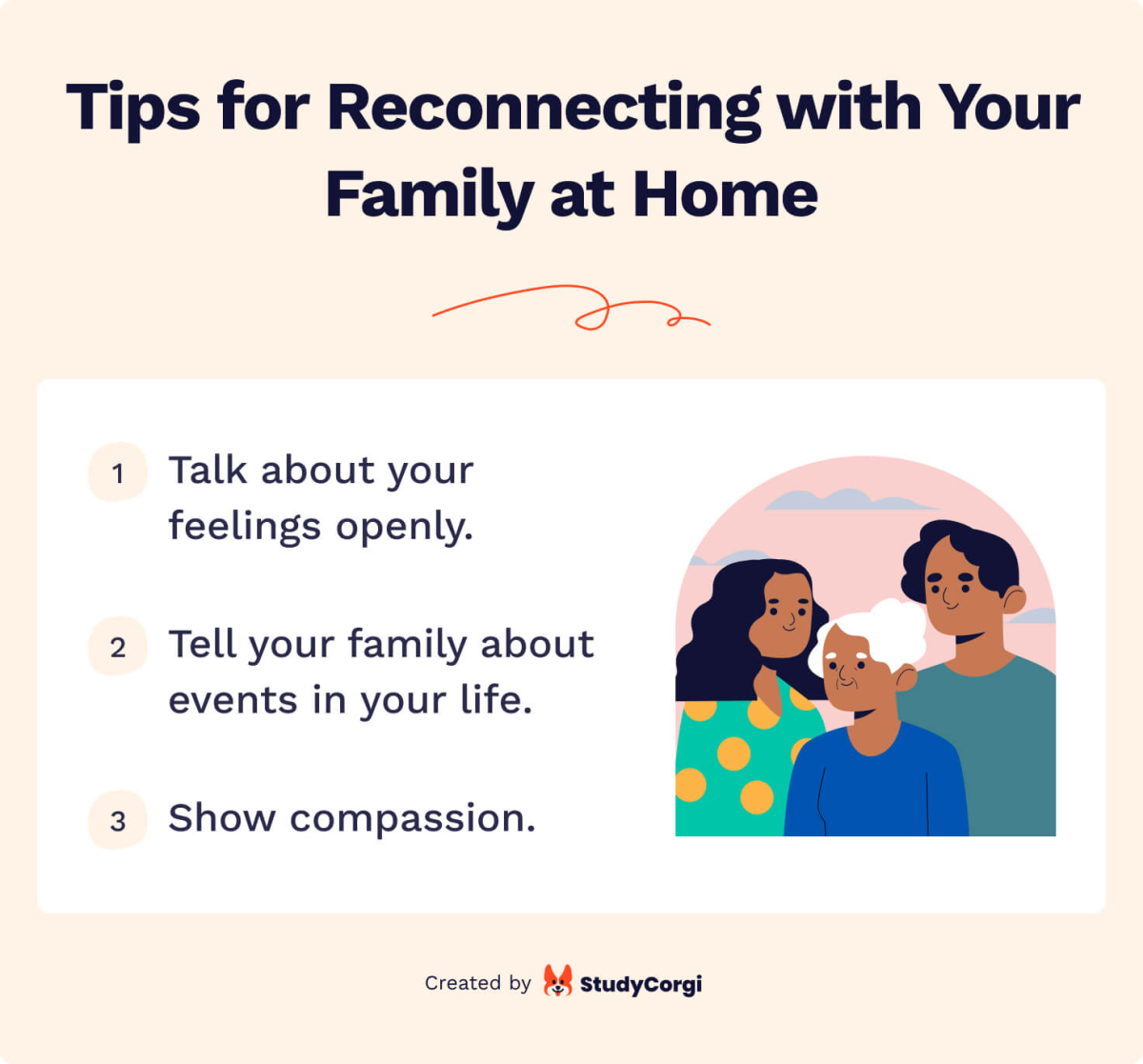
🎁 BONUS: Organizations That Empower First-Gen Students
And here’s a bonus for our most devoted readers! Check out this list of organizations that can help you become a successful and empowered first-gen student:
- Rise First. This company aims to build a worldwide online community where first-gen students can communicate and solve problems together.
- First Gen Support. This organization hosts online webinars where mentors and other first-gen students can communicate and help each other. They also host a college fair for under-resourced students.
- Center for First-Generation Student Success. NASPA proposes many programs to help first-gen students achieve their goals.
- I’m First. This project was established in 2013. It aims to inspire, enlighten, and encourage first-gen students on their path to and through college.
- FirstGenU. Through the FirstGenU platform, students can get access to a high-production online curriculum and virtual enrichment activities.
Other Resources to Check Out
In addition to the organizations we’ve mentioned, we would like to recommend you several amazing books and speeches written specifically by first gens. They will help you feel seen and get a motivational boost!
First, here are a few TED Talks relevant to the first-generation experience. TED Talks are well-known for their videos from knowledgeable speakers on various subjects, including business, science, technology, and creativity.
💬 Lyric Swinton: What I have learned as a first-generation college student. This speech will tell you how to overcome first-generation stereotypes and continue your academic development.
💬 Jamurai Bryan: LEGACY: First Generation Perspective. Here, you can listen to the life story of a first gen student like yourself.
💬 Kriti Gupta: Finding an Identity as a First-Generation Immigrant. If you’re a first-gen American, this speech is just what you need to overcome the issues of cultural identity in US colleges.
Additionally, here are some of the best books written by and about first-generation college students:
📗 50 Things I Wish Someone Would Have Told Me About College. This book is a treasury full of tips written by other first-gen students.
📗 First-Generation College Student Experiences of Intersecting Marginalities. This book explores the intersections between first gens and other identities like race, class, gender, and sexuality.
📗 First-Generation College Students: Understanding and Improving the Experience from Recruitment to Commencement. Here you’ll find many valuable tips about various scholarships, grants, and job opportunities.
📗 The Journey Before Us: First-Generation Pathways from Middle School to College. This book shares the experiences of prospective first-generation college students as they transition from middle school to young adulthood.
📗 Giants among Us. This book will tell you about the first-gen experience of other people of different backgrounds. It describes their feelings, their interactions with families, and more.
This concludes our article! We hope you’ve enjoyed it and found it helpful to solve any first-generation college student issues you might face. Good luck on your path to academic success!
